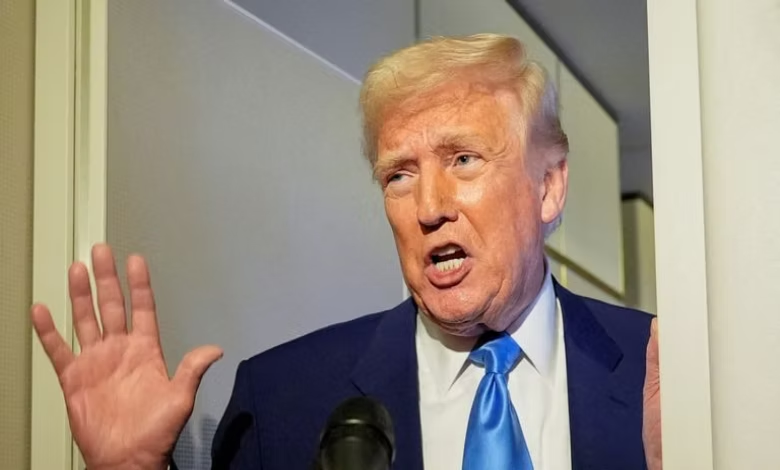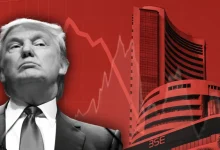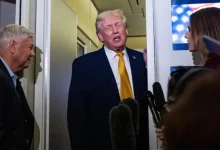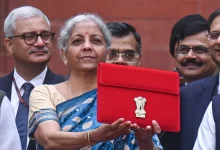Trump Defends Tariffs as “Economic Medicine” Amid Market Turmoil

On Sunday, April 6, 2025, President Donald Trump reiterated his determination to enforce broad tariffs on imports from most nations, insisting he would not back down until trade balances are achieved with the United States. Speaking from Air Force One, he brushed off the ongoing financial market downturn, remarking, “sometimes you have to take medicine to fix something.” This analogy underscores his view that the tariffs, although causing immediate economic disruption, are essential to counteract what he describes as inequitable trade practices that have harmed the U.S.
Tariffs Set for April 9, 2025
Announced on April 2, 2025, as part of a central campaign promise, the tariffs are slated to begin on Wednesday, April 9, 2025. Trump’s objective is straightforward: to eliminate trade deficits—which he sees as equivalent to economic losses—and to secure trade surpluses or at least a balance with other nations. “I spoke to a lot of leaders, European, Asian, from all over the world,” he noted, adding, “They’re dying to make a deal. And I said, we’re not going to have deficits with your country.” This firm stance has ushered in a period of heightened economic uncertainty with no quick fix in sight.
Market Reactions and Economic Concerns
Financial markets reacted strongly to the announcement. On the evening of April 6, 2025, futures for major indices plummeted—Dow Jones and S&P 500 futures fell nearly 4%, while Nasdaq futures dipped almost 5%. Bitcoin, which had remained relatively steady, dropped by close to 6%. These sharp declines have raised alarms about a potential recession and broader disruptions to the global trading system, echoing concerns from analysts and international leaders. Yet, Trump appears resolute, contending that short-term market discomfort is a necessary sacrifice for long-term economic strength.
Administration’s Defense and Ongoing Negotiations
High-ranking officials have stood behind the tariffs. Treasury Secretary Scott Bessent stressed the long-term benefits, noting that correcting unfair trade practices is not an overnight solution. “The United States must see what the countries offer and whether it’s believable,” he stated, hinting at a cautious negotiation process. Commerce Secretary Howard Lutnick affirmed the tariffs’ implementation, declaring, “The tariffs are coming. Of course they are,” and promising their enforcement for “days and weeks.” Additionally, top White House economic adviser Kevin Hassett revealed that over 50 nations have initiated talks, indicating that some countries are prepared to negotiate despite initial protests and retaliatory actions from nations like China.
Global Repercussions and Impact on Allies
The tariffs have strained U.S. relations worldwide, affecting both adversaries and allies. China has responded swiftly with countermeasures, while allies such as Israel and Vietnam are also in the crosshairs. Israel now faces a 17% tariff, prompting Prime Minister Benjamin Netanyahu to arrange a White House meeting on Monday, April 7, 2025, to discuss the issue with Trump. In contrast, Vietnam’s leader has shown readiness to lower tariffs to zero if a satisfactory deal is reached, as reported by Trump. Italian Premier Giorgia Meloni, though critical of the policy, has expressed a willingness to negotiate in order to safeguard Italian businesses. This wide-ranging impact highlights the tariffs’ potential to reshape global trade dynamics.
Also read: Asian markets, oil prices Plummet as Wall Street bleeds over Trump’s tariffs
Balancing Long-Term Vision with Immediate Costs
Trump’s approach aligns with his long-held opposition to trade deals he deems disadvantageous to the U.S., a position consistently emphasized since his campaign. Betting on the public’s ability to endure higher prices on everyday goods, he maintains that this tough stance will eventually yield economic prosperity. “WE WILL WIN. HANG TOUGH, it won’t be easy,” he declared online, rallying his supporters. Treasury Secretary Bessent reinforced this view, suggesting that a recession is not inevitable, but rather, a phase in building robust, long-term economic fundamentals.
#WATCH | As the US stock markets tumbled after the imposition of retaliatory tariffs, US President Donald Trump says, "…I don't want anything to go down. But, sometimes, you have to take medicines to fix up things."
— ANI (@ANI) April 7, 2025
(Source – US Network Pool via Reuters) pic.twitter.com/kzeliFsu7r
Conclusion
President Trump’s steadfast commitment to tariffs, which he metaphorically describes as “medicine” for the economy, sets the stage for a bold and risky economic experiment. As markets reel and global leaders scramble to adjust, the tariffs scheduled for April 9, 2025, represent a dramatic effort to redefine U.S. trade relationships. Although negotiations with more than 50 countries offer a potential path forward, the immediate fallout—evidenced by market drops and international retaliations—underscores the steep short-term costs of this strategy. The ultimate effect of this “medicine” on the U.S. economy remains uncertain, but Trump and his team are resolute in their belief that it will lead to eventual victory.




